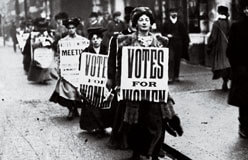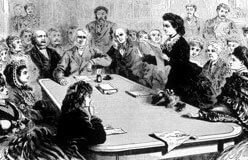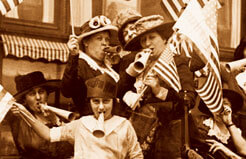When this country began more than 200 years ago, almost everyone accepted the idea that a white woman’s job was to take care of her home and family.
Enslaved African-American women were expected to do hard labor in the fields or work in plantation homes as well as take care of their own families.
Married women could not own property, such as land and buildings. Nor could they keep any money they might earn. In rare cases of divorce, the father received custody of the children. Women could not sit on juries, defend themselves in court, or run for political office. They were considered intellectually unfit to vote.
Of course, poor free women, many of them recent immigrants, usually had to work outside the home. Even wealthy women often took care of their husbands’ businesses when the men were away. In the 1800s, more and more women came to see that they were just as capable as men. Therefore, they believed, they deserved the same legal rights that men had. They realized that being able to vote was a crucial first step to obtaining other rights. They also knew that they themselves would have to lead the movement that would win them suffrage—the right to vote. These women became the suffragists.







